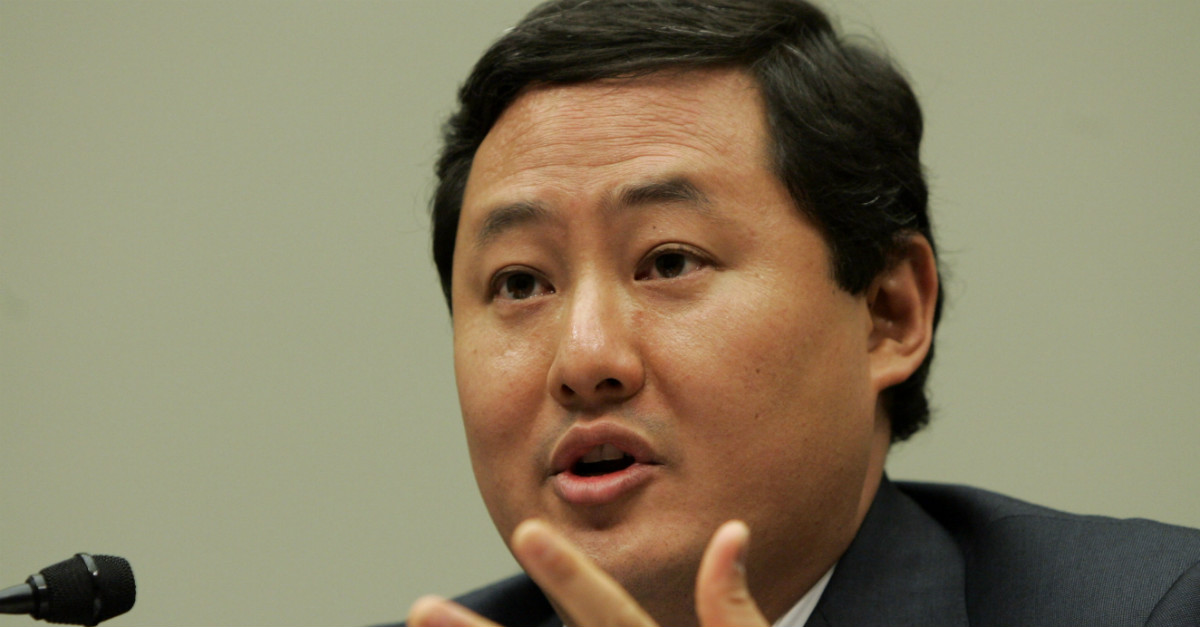When John Yoo, the former George W. Bush administration lawyer who singlehandedly legalized the use of torture on terrorism suspects, says that a president has gone too far, the time has come for that president to look himself in the mirror and wonder if he is being advised correctly by his attorneys.
Videos by Rare
Unfortunately for Donald Trump, he’s only three weeks into his administration, so firing a top official would look terrible. But still….it’s John Yoo giving this advice. That really says something.
Writing in the New York Times yesterday in a piece titled “Executive Power Run Amok,” Yoo makes the case that President Trump doesn’t seem to understand the separation of powers under the U.S. Constitution. According to Yoo, Trump is overlooking the fact that many of his policy proposals — funding a wall along the U.S.-Mexican border and slapping a tariff on Mexico to pay for it — would be unconstitutional if Congress refused to approve. Trump’s executive order on Muslim immigration could be justified on constitutional grounds, except that Rudy Giuliani already said that the order is designed to keep members of a specific religion out of the United States.
RELATED: This election is why libertarians are always harping on about executive power
But it’s this quote from Yoo that really takes the cake:
In his Inaugural Address, Mr. Trump did not acknowledge that his highest responsibility, as demanded by his oath of office, is to “preserve, protect and defend the Constitution.” Instead, he declared his duty to represent the wishes of the people and end “American carnage,” seemingly without any constitutional restraint.
Let’s talk about “constitutional restraint” for a moment. It’s a funny term coming from a man who wrote some of the most extreme legal documents ever produced by the Bush White House. Here’s a very brief primer:
- In a September 25, 2001 opinion, Yoo wrote that because the United States was suddenly attacked, the president need not worry about acquiring congressional approval for the use of force before deploying America’s military. The period after 9/11 was considered to be a national emergency by Yoo and that was the only rationale the president needed to start bombing al-Qaeda and Taliban positions. Jack Goldsmith, who would later head up the Office of Legal Counsel after Yoo departed the administration, would call this opinion “remarkable” in its assertion of executive power.
- In a January 9, 2002 memo, Yoo wrote to the White House Special Counsel that the conflict against al-Qaeda doesn’t fall under the Geneva Conventions and that al-Qaeda detainees therefore weren’t entitled to common Article 3 protections — the absolute minimum conditions that prisoners receive when they’re in custody.
- In an August 1, 2002 opinion, Yoo argued that the War Crimes Act was written in such a way that American interrogators could use harsh techniques on detainees so long as they didn’t elicit pain for pain’s sake. The detainee would also have to demonstrate “prolonged harm” and the pain would have to be so extreme that the detainee was at risk of organ failure. This twisted the War Crimes Act into a pretzel so U.S. personnel could get away with torture without having to be concerned about prosecution.
RELATED: You didn’t care when Obama did it
The U.S. Supreme Court would eventually tear up these legal interpretations in two cases, one that allowed enemy combatants the right to common Article 3 protections and the other that provided detainees at Guantanamo the right to challenge their detentions. The Office of Legal Counsel, the same that Yoo worked for, later tossed most of his opinions in the garbage.
Over a decade after those opinions were written and used by the Bush White House as legal cover for an unprecedented expansion of executive power, John Yoo is now lecturing the current commander-in-chief to be careful about stepping over his constitutional boundaries. Perhaps if Yoo had distanced himself from his past stint in government, we could take him seriously. But to this day, he remains confident that his legal judgments were perfectly reasonable — that waterboarding, stuffing human beings into small boxes for hours, slapping prisoners to get their attention, and hanging them from the ceiling, were interrogation tactics on the right side the law.
Instead of lecturing Trump, Yoo should keep quiet, stay in his Ivory Tower as a law professor, and stop insulting our intelligence.



